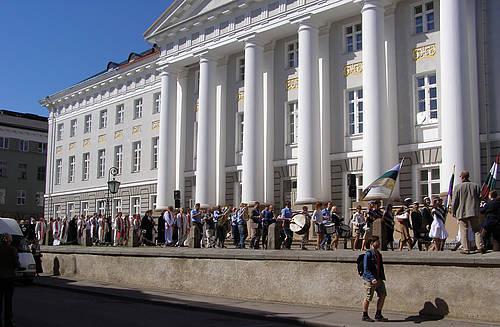Perseverance, a cardinal virtue that enabled them to survive decades of Soviet domination, is "no longer enough" for Estonian churches confronting "a newly materialistic and in many ways a 'post-Christian' culture". This view of the current context and challenges to the country's churches was shared by World Council of Churches (WCC) general secretary Rev. Dr Samuel Kobia with Estonian church leaders in the country's capital, Tallin, on Friday 1 June.
Ecumenical challenges in newly independent post-Communist secularized societies has been the leitmotif of Kobia's 29 May - 2 June official visit to Latvia and Estonia.
Earlier on, addressing Latvian church leaders on Tuesday 29 May in Riga, the WCC general secretary noted that in spite of "strong attempts" to make people leave the church during the Soviet era, "the gospel was not replaced by atheistic propaganda". Rather, the churches remained and, after the fall of communist regimes, even started to grow.
However, he warned, "the collapse of a totalitarian state system did not save churches from other challenges, including secularism, religious relativism and consumerism".
According to Kobia, in the case of Estonia, the churches are facing two major challenges in a country that, "in opening up to free market systems", is experiencing "deep and rapid changes". These are, on the one hand, the "strong individualism and consumerism of market societies" and, on the other, the bi-ethnic composition of the society (Estonian and Russian).
But "You are not the only ones wrestling with these problems," Kobia told his audience of representatives of the Estonian Council of Churches, assuring them that "the world-wide church can accompany you in your efforts for a credible witness of churches in your society".
Explaining that WCC member churches have been working together for ten years on the consequences of economic globalization, he invited the Estonian churches to "join the debate" by participating in the WCC's AGAPE process - an attempt to offer clear analysis and critiques of as well as alternatives to this global phenomenon.
On the need for reconciliation and healing between the country's Estonian majority and Russian minority, "other member churches are confronted with similar challenges," Kobia said. In particular, a WCC Faith and Order Commission study on "Ethnic identity, national identity and the search for the unity of the church" could provide useful insights here Kobia said, while emphasizing that "reconciliation between churches and strengthened ecumenical relationships are vital".
In Latvia, Kobia met the leadership of the Evangelical Lutheran Church of Latvia, as well as heads of Orthodox, Catholic, Baptist and Pentecostal churches. Kobia also met with top government officials, including Prime Minister Aigars Kalvitis, and visited the Museum of the Occupation which looks at living conditions under both the Nazi and Soviet occupations between 1940 and 1991.
In Estonia, Kobia's programme included meetings with the leadership of the Estonian Evangelical Lutheran Church (EELC), as well as representatives of member churches of the Estonian Council of Churches.
On 2 June the WCC general secretary attended events celebrating the church's 90th anniversary in Tartu, where he received the First Rank Cross of Merit from the EELC as a sign of gratitude for his contribution to ecumenical work. Also in Tartu, Kobia met with Estonian President Toomas Hendrik.
The full texts of Kobia's addresses are available on the WCC website:
Address to the heads of churches in Latvia
Address to the Estonian Council of Churches
External links:
Evangelical Lutheran Church of Latvia (only in Latvian)
Estonian Evangelical Lutheran Church (in English)
